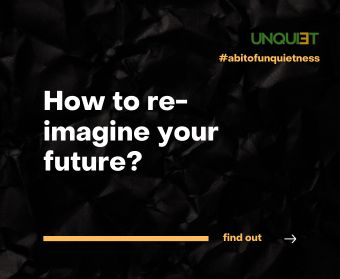Deep down, we all know about impermanence – we know that we cannot step into the same river twice as the river is in the constant process of transformation, and so are we. The Zen Master Thích Nhất Hạnh wrote in one of his books, “If things are not impermanent, growth would be impossible, and manifestation would be impossible… Impermanence is the very heart of life.” But often, we stop short of embracing the impermanence and re-imagining our future because we do not believe that things could be different or have lost hope in what the future could bring.
Finding freedom in hope.
I recently read a book – The Gift: 12 Lessons to Save Your Life, by Edith Eger, a holocaust survivor, and the most memorable statement for me from her book was:
Freedom comes from having hope – the curiosity to discover what comes next.
When we are willing to take the next step in our lives by embracing the essence of impermanence and having hope, we are being brave. Freedom and hope can be seen as the two significant threads that, when weaved together, strengthen you. When you believe in your freedom to choose the future you want – you are willing to accept the impermanence and embrace change.
But often, breaking out of an existing thought pattern is hard – is it fear that holds us back into the status quo? It is the fear of the unknown – where you will ask yourself questions like “Is it worth taking the risk?” or “What if things get worse?”
As such, questions begin to bounce into your mind when you explore newer opportunities; one way to assure yourself is by being reminded that you must do things differently to get different results – old keys won’t open new doors.
Self-awareness is the first step.
The door toward reimagining our future begins by knowing where we have been and embracing our journey. And this is where I invite you to Indigenous knowledge and wisdom by sharing a whakataukī or Māori proverb, which reads as follows:
Kia whakatōmuri te haere whakamua
‘I walk backwards into the future with my eyes fixed on my past’.
It speaks to Māori perspectives of time, where the past, the present and the future are viewed as intertwined, and life as a continuous cosmic process. The past is central to and shapes present and future identity as the individual carries their past into the future (see Rameka, 2017 for more details). This is also echoed by the Zen Master Thích Nhất Hạnh, who writes, “If we look deeply at the present moment, we see the past and the future in it.” Therefore, there is a significant gain in self-awareness as we can illuminate the present by better understanding our past.
Experts suggest that self-awareness comes through mindful practices, which help us become attuned to our internal experiences and observe our thoughts and feelings. However, this process can be uncomfortable, and cultivating greater self-acceptance, compassion, and resilience is vital.
Through self-awareness, we can discover who we are and what is holding us back and open ourselves to possibilities. We become aware of our life story and can choose to take it in our preferred direction based on things we control and acknowledging what we cannot control or influence.
However, we must remember that we do not change until we are ready – and willing to interrupt the beliefs, habits, and patterns that no longer serve us to become the real you.
Reclaiming your story.
Self-awareness allows us to tell the truth to ourselves, which leads to honesty and a new vision of ourselves. The journey of self-awareness is ongoing and passes through transitions, showing us that we must be free and ready to embrace impermanence, so how do you begin?
Here are a few questions to guide you:
Where are you now? What is the story you tell yourself? Where have you been?
What are the turning points or critical decisions you have made along the way in your life’s journey?
When did you form the aspiration you’re currently pursuing, and how have you changed since then? (From Think Again by Adam Grant)
I wanted to conclude by emphasising that taking care of the future needs taking care of the present and often braving the wilderness in search of our story to build a deeper connection with our true selves. Are you embracing your real story?
Resources to further explore:
“You are here” by Zen Master Thích Nhất Hạnh
“The Gift: 12 Lessons to Save Your Life” by Edith Eger
Rameka, L. (2017). Kia whakatōmuri te haere whakamua: ‘I walk backwards into the future with my eyes fixed on my past’. Contemporary Issues in Early Childhood, 17(4), 387– https://doi.org/10.1177/1463949116677923
If you enjoyed this article, please share it with your friends and family.
If you want to receive A Bit of Unquietness blog directly to your mailbox, please subscribe by joining our mailing list.

